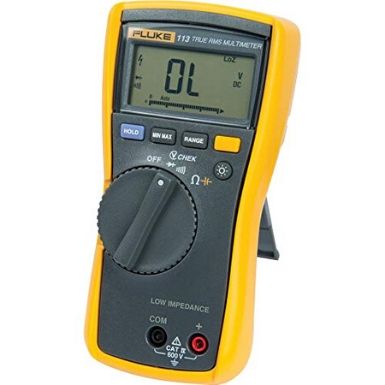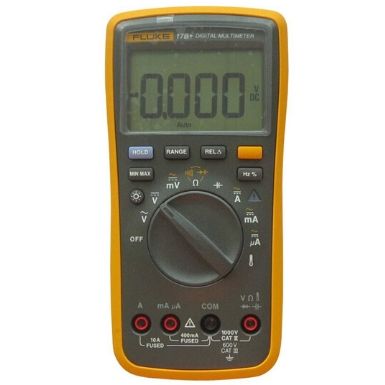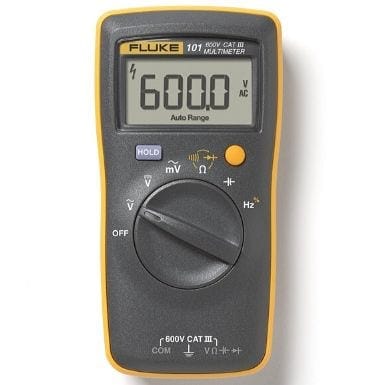10 Best Fluke Multimeters of 2025 – Reviews & Buying Guide
-
Pete Ortiz
- Last updated:
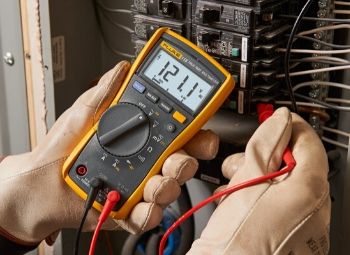

Although any multimeter wearing Fluke’s badge will provide you with accurate readings and superb reliability, they do have different strengths, weaknesses, and feature sets that could make one more applicable than another for specific situations. The following 10 reviews will simplify the information and help you determine which of the Fluke multimeters will best fulfill your needs.
A Quick Comparison of Our Favorites in 2025
| Rating | Image | Product | Details | |
|---|---|---|---|---|
Best Fluke Multimeter for Electronics & General

|

|
Fluke 117 |
|
CHECK PRICE |
Best Fluke Multimeter for Automotive

|
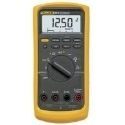
|
Fluke 88V 1000V |
|
CHECK PRICE |
Best Fluke Multimeter for HVAC

|

|
Fluke 116 |
|
CHECK PRICE |
|
|

|
Fluke 87-V |
|
CHECK PRICE |
|
|
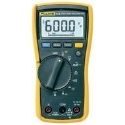
|
Fluke 115 Compact True-RMS |
|
CHECK PRICE |
The 10 Best Fluke Multimeters
1. Fluke 117 – Best Fluke Multimeter for Electronics & General
For true RMS measuring at a price that’s pretty affordable considering what it is, we think the Fluke 117 is the best general-purpose Fluke multimeter available. It’s ultra-accurate, a trait that Fluke meters are known for. It can measure a continuous 10 amps or 20-amp overload for 30 seconds. Though it’s safety rated for CAT-III 600V, we would have liked to see a CAT-IV safety rating as well.
This unit features separate inputs for voltage and current to help improve safety. The low impedance stops ghost readings from being an issue. To help speed up your workflow, the 117 features VoltAlert non-contact voltage detection that allows you to determine if a source is hot without having to hook up your leads. The backlit screen and kickstand were convenient features that we always appreciate, although we would have liked to see a magnet as well. The 40-megohm resistance isn’t the best, though it should be sufficient for most applications. In all, we think the price and features of the 117 make it the best Fluke multimeter overall.
- True RMS
- Measures 20-amp overload for 30 seconds
- CAT-III 600V safety rated
- Affordable
- No CAT-IV safety rating
- No magnet
2. Fluke 88V 1000V – Best Fluke Multimeter for Automotive
If you want the cream of the crop multimeter that’s packed with almost every feature imaginable, the Fluke 88V 1000V digital multimeter is a top of the line choice. Expect to spend a small fortune on the quality provided by this device. Features, such as millisecond pulse-width measurements for fuel injectors and RPM measuring, will appeal to any mechanic and make this an excellent multimeter for automotive use. The 0.1 percent DC accuracy is one of the best available, and the maximum resistance of 50 megohms leaves little to be desired. For peace of mind, this device is CAT-III and CAT-IV safety rated.
Though it’s rated for 10-amp continuous measuring, the 88V can handle 20-amp overloads for up to 30 seconds. Speaking of performance, there’s not much about this tool to warrant complaints. At this price, we would like to see a built-in magnet and kickstand just for the added convenience.
- Millisecond pulse-width measurements
- CAT-III and CAT-IV safety rated
- Max resistance of 50 megohms
- 1 percent DC accuracy
- RPM measurements
- Expensive
- No kickstand or magnet
3. Fluke 116 – Best Fluke Multimeter for HVAC
When you need a complete HVAC measurement device, the Fluke 116 multimeter offers all of the functionality you need for day-to-day professional performance. It’s able to test resistance, continuity, frequency, capacitance, temperature, and even microamps for testing flame sensors. All of this comes in a compact design that makes one-handed use easy. The low impedance prevents ghost readings and the CAT-III 600V safety rating keeps you safe. Of course, we would have liked to see a CAT-IV rating as well.
We only have two gripes with the Fluke 116. First, there are only leads for common and input. Generally speaking, we prefer to have multiple inputs for safety reasons, though the single input design is very easy to use. Our last complaint is the lack of a magnet or kickstand. Most of the Fluke meters are compatible with their optional magnetic hanger, but it leaves your meter dangling and it’s not built in. For the premium cost of a Fluke, we’d like to see these convenient features present in them all.
All in all, this is one of the best Fluke multimeters out there for automotive work.
- Built-in thermometer
- Microamps for testing flame sensors
- Lo-Z prevents ghost readings
- Only common and input leads
- No CAT IV safety rating
- No magnet or kickstand
4. Fluke 87-V Digital Multimeter
Although it’s priced just as high, we didn’t feel the Fluke 87-V lived up to the bar set by the 88V, which is why it’s relegated to the fourth position on this list. That said, it’s still a very capable meter that shouldn’t be discounted, though we have a very difficult time getting over the price. This model sports an incredible DC accuracy of 0.05 percent. It’s CAT-III and CAT-IV safety rated, and the low-pass filter allows for accurate frequency measurements on adjustable speed drives. Resolutions of 6,000 and 20,000 are available, allowing you to see minute changes in reading. A lifetime-warranty rounds out the robust feature set.
Despite all of these notable strengths, the 87-V does have a few drawbacks also. First, it doesn’t include a manual of any kind which can be a bit frustrating with a complicated device, such as a multimeter. There was also no case included, which we would like to have at this price to protect such an expensive investment. Finally, the leads are extremely stiff and not fun to work with. We hoped for the soft silicone leads that Fluke is known for, but they weren’t present with our unit.
- CAT-III and CAT-IV safety rated
- Low-pass filter
- 05 percent DC accuracy
- Lifetime warranty
- 6,000 and 20,000 resolution available
- Very expensive
- Leads are very stiff
- No manual
- No case
5. Fluke 115 Compact True-RMS Digital Multimeter
Don’t let the compact size of the Fluke 115 multimeter fool you, it’s a very capable little device. It’s far from cheap, though it’s also not one of Fluke’s higher-priced options. It includes a carrying case, which we think is a nice touch for the price. This is a true RMS meter that can check continuity, frequency, capacitance, and even perform diode tests. It is CAT-III safety rated for 600V, but we’d like to see a CAT-IV safety rating too.
With respectable performance and features, it’s hard to pick out too much wrong with the 115 multimeter. One thing we did notice is that the knob isn’t as good as on some of the other models. It didn’t click into place as firmly, and occasionally was positioned in between settings without us knowing. This caused the device not to read a hot circuit we were testing. Luckily, we noticed the issue before diving into it, though it could have been potentially dangerous if we hadn’t.
- 20A measure for 30 seconds
- Carrying case included
- True RMS
- No CAT IV safety rating
- No magnet
- Knob leaves us wanting
6. Fluke 77-IV Automotive Digital Multimeter
With four inputs and min/max recording capability, the Fluke 77-IV is an excellent multimeter for any automotive application. It doesn’t quite match the 88V though, but it is priced a bit lower. One major flaw that held the 77-IV back was that it’s not a true RMS multimeter. If you need true RMS capabilities, you’ll have to spend the extra on the 88V instead. Despite this drawback, this unit is still very capable. It takes all of the standard measurements and provides an accuracy of 0.3 percent. The large backlit LCD display is easy to see in any conditions, though we prefer the white backlight that’s available with some of the other Fluke models.
- Four inputs
- CAT-III 1000V and CAT-IV 600V rated
- Expensive
- No true RMS
7. Fluke 15b+ Digital Multimeter
The Fluke 15b+ is one of the more affordably priced Fluke multimeters available. That doesn’t mean it’s a slouch though. Four inputs adorn the front where a large white backlit LED screen makes it easy to see your readouts. The CAT-II and CAT-III safety ratings provide some peace of mind, but as always, we’d like to see a CAT-IV safety rating.
We did notice that the Fluke 15b+ was much slower to change readings than some of the other meters we tested it against. The 4,000-count resolution isn’t as good as the 6,000-count standard on some of the higher-end Flukes, especially when you factor in the 20,000-count capabilities they offer. Not everyone needs this feature though, and this model lets you save some money by omitting it if you don’t require such precision.
- Four inputs
- CAT-III 600V
- 4,000-count resolution
- Slow to change readings
- No CAT-IV safety rating
8. Fluke 113 True-RMS Utility Multimeter
The Fluke 113 brings true RMS measuring and 6,000 count resolution down to a price point that’s affordable for most professionals and hobbyists alike. This model checks voltage and continuity simultaneously, saving you time and increasing your productivity. The low impedance prevents ghost readings and the backlit screen makes it easy to see, no matter where you find yourself working.
We did have a few complaints after getting acquainted with the Fluke 113. First, there are only common and input jacks for connecting leads. Generally, we prefer to have multiple inputs for different types of testing. The selector knob also has only three choices. While this unit does auto-range most of the measurements, it would still be nice to have more variability for user selection. Finally, even though this is a lower-priced model for a Fluke, it’s still expensive for a multimeter, and we’d like to see some convenience-oriented features—such as a magnet. There is a kickstand built-in, but we found it to be pretty flimsy and not as strong as we’d like.
- Affordable
- Checks voltage and continuity simultaneously
- Low impedance
- True RMS
- No magnet
- Kickstand is very flimsy
- Not as much variability
- Only two inputs
9. FLUKE 17B+ Digital Multimeter
Lacking true RMS capability, the Fluke 17B+ seems overpriced compared to some of the other multimeters in the Fluke lineup. The 40-megohm resistance isn’t spectacular, though it is adequate. The 4,000-count resolution isn’t up to par when you consider the 6,000 count that is standard on many other Fluke meters in the same price range.
We experienced slower readings and lower precision with this meter. It is CAT-III and CAT-IV safety rated which we did appreciate, but that’s not enough to redeem this multimeter. Useful for basic electrical metering, it’s just not one of the best Fluke offerings.
- CAT-III and CAT-IV safety rated
- No true RMS
- Slower readings
- Lower precision from low count resolution
10. Fluke 101+ Multimeter
As the most affordably priced multimeter available from Fluke, we had high hopes for the 101+, though we didn’t expect much. It is CAT-III 600V safety rated, and the small design is lightweight enough for easy one-handed use. It’s not a true RMS multimeter, but at a fraction of the price that other Fluke meters go for, we didn’t expect it to be.
We were a bit frustrated at how slowly the 101+ responded to changes, taking several seconds to register. This got to be annoying pretty quickly, but the real problem was the inaccuracy. It wasn’t on every reading, but we did notice that sometimes the reading just wouldn’t come out correct. Even at this low price, we would like to see a backlit display to make the screen easier to view. Despite these flaws, it’s still a great multimeter for the low price—it’s just not one of the best options from Fluke.
- Most affordable Fluke multimeter
- No true RMS
- Slow response
- Inaccurate readings
- No backlight
Buyer’s Guide – Choosing the Best Fluke Multimeter
Now that you’ve seen our top picks of Fluke multimeters, it’s probably good to clue you in on how we compared these different models. When you look for a multimeter, there are certain features that you should prioritize depending on what needs you want your device to fulfill. This section is intended to help you identify those needs and features to ensure you make the best decision possible that truly meets and exceeds your needs.
Task-Specific Measurement
While all of these Fluke multimeters will provide you with the basic measurements you need for testing electrical circuits, some will have the ability to do particular measurements that are field-specific.
- When looking for an automotive multimeter, you may give preference to measurements, such as RPMs or millisecond pulse-width.
- Electricians may prefer to have a non-contact voltage feature, which will allow them to speed up their workflow considerably by no longer having to physically test each circuit.
- For an HVAC technician, a thermometer for temperature readings may be more important, as well as microamp measurements for testing flame sensors.
While specific models may have features that are particularly useful for a certain type of electrical work, none of them will have all of the features for all of these fields. You’ll need to decide which features to prioritize, and then make a purchase based on which meter fills those needs the best.
Convenient Features
No matter what you’re using your multimeter to test, there are certain convenience features that we prefer to see in every device. Unfortunately, these are often missing, since they are luxuries rather than necessities. When a meter comes equipped with these though, we always appreciate the improved ease of use.
We feel that some features, such as a backlit screen, are pretty much a necessity. No matter what type of work you’re doing, it’s very likely that you’ll find yourself in low-light conditions at some point. When you do, the backlit display will become a lifesaving feature that makes your life so much easier. Likewise, magnets and kickstands do so much to improve the functionality of your device that we almost always prefer to have them. While the Fluke meters do not have built-in magnets, they do have an additional magnet hanger available separately.
Resolution
The resolution of a Fluke multimeter is measured in counts. The number represents the highest readout that the display will give. Higher numbers mean more precise readings. Many of the multimeters that we tested were rated for 6,000-count resolution. Some of the less precise models only offered a resolution of 4,000 counts. The highest-end models offered counts up to 20,000, so you’ll need to figure out just how accurate you need your multimeter to measure.
Price
If you’re buying a Fluke multimeter, you’ve already decided that getting a high-quality and dependable unit is more important than saving a few dollars. The safety features, reliability, and accuracy of a Fluke unit make it worth the extra cost. But there is a major price discrepancy even among Fluke models. The most expensive and capable models cost more than seven times what the most affordable one does.
For a professional who is going to rely on this tool every day to provide safe and accurate measurements, it’s absolutely worth it to spend the extra money and get one of the top-of-the-line models with every functionality that you need. The Fluke lifetime-warranty ensures that any of these meters is a sound investment though, so don’t feel that you need to shell out top dollar to get the reliability and trustworthiness that Fluke is known for.
Hobbyists and professionals who won’t be putting their multimeter to daily use may instead find better value in one of the slightly more affordable Fluke products. Just because they’re less expensive, doesn’t mean they’re less capable though. Read through our reviews to see how some of the affordable Fluke models stack up, and you’ll feel confident purchasing one for your tool kit.
It’s also worth mentioning that we recently reviewed mini/pocket multimeters. See the winners of our tests here!
- See Also: Fluke 115 vs Fluke 117: Which One’s Best?
- See Also: 8 Best Multimeters In Canada
Conclusion
After reading the buyer’s guide and our reviews of the 10 best Fluke multimeters, you should have a pretty good idea of what makes a good multimeter, and which models may better suit your needs. For almost any application, you can’t go wrong with the Fluke 117 true RMS multimeter. Rock-solid dependability and true RMS readings are combined in a package that’s affordable for professionals and hobbyists alike, we feel confident recommending it as the best general-purpose multimeter.
For automotive-specific use, the Fluke 88V 1000V multimeter is our top pick. Able to measure RPMs, millisecond pulse-width for fuel injectors, and all the other standard tests to a 0.1 percent DC accuracy. The only drawback to this model is the premium price. Finally, for an HVAC specific tool, we think the Fluke 116 is hard to beat. With a built-in thermometer and microamp readings for testing flame sensors, it’s got all the features necessary for any HVAC repair technician.
Related Reads:
- 10 BEST BATTERY-POWERED PRESSURE WASHERS
- 10 BEST BUDGET PORTABLE GENERATORS
- 10 Best Multimeters in the UK – Reviews & Top Picks
Contents








